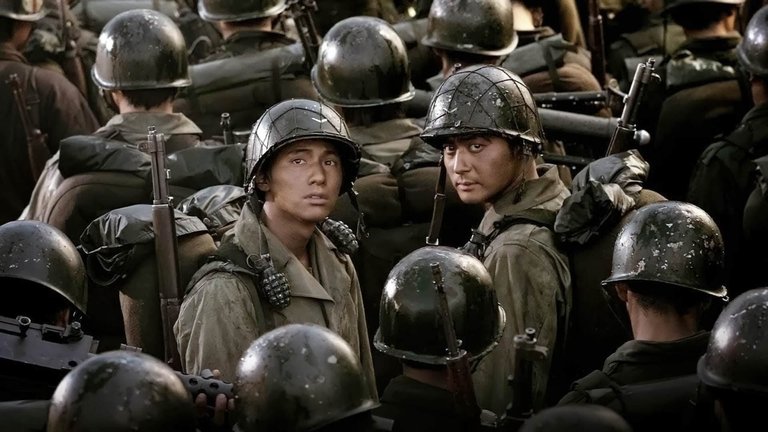Retro Film Review: Taegukgi: The Brotherhood of War (2004)

The 20th century proved to be particularly harsh for many nations across the globe, yet few experienced its adversities as profoundly as Korea. Enduring the oppressive Japanese rule for much of the first half of the century, Korea's liberation only ushered in a brutal division followed by a devastating war that concluded in the worst possible way – without victors, leaving behind enduring traumas that continue to afflict Koreans to this day. Some of these struggles served as the inspiration behind Shiri, a 1999 film that later introduced South Korean cinema to audiences worldwide. In 2004, its creator Kang Je-gyu delved into the bloody origins of the current Korean division - the actual war - in his epic Taegugki (also known as The Brotherhood of War). This film, one of the most expensive in South Korean cinematic history, proved to be a resounding success at the box office.
The storyline is relatively straightforward, commencing with two brothers residing in post-WW2 Seoul, the capital of South Korea, striving to forge a brighter future. Jin-Tae (portrayed by Jang Dong-gun), the elder sibling, aspires to wed his beloved Young-shin (played by Lee Eun Ju), yet must first support the family, including their ailing mother, through a shoe-shining business. Meanwhile, the younger Jin-seok (portrayed by Won Bin) is slated for college. However, in June 1950, their aspirations are shattered as Communist forces from the North invade the South. Amidst the ensuing turmoil, Jin-seok is conscripted into the retreating South Korean army, prompting Jin-tae to enlist to safeguard his younger brother. A pact is struck between Jin-tae and his superiors - he will undertake the most perilous missions, aiming to earn the highest accolade, with the condition that Jin-seok will be discharged upon his achievement. As the tides of war shift with American assistance, and the Southern forces advance towards the Chinese border, Jin-seok, unaware of the pact, begins to question his brother's seemingly reckless valour, which often borders on sheer bloodlust. Unbeknownst to both brothers, fate is poised to separate them in the cruellest manner imaginable.
Taegukgi is frequently likened to Steven Spielberg's Saving Private Ryan, a film that introduced a starkly realistic portrayal of warfare to audiences accustomed to more sanitised depictions. While both films employ a similar narrative device with a present-day prologue, their distinctions swiftly emerge. Unlike Spielberg, who reserves the raw brutality of war for the initial segments before transitioning to a more conventional narrative, Kang Je-Gyu maintains a relentless intensity throughout, depicting the harsh realities of modern warfare until the film's conclusion. The depiction of war in Taegukgi is notably more explicit, making Saving Private Ryan appear comparatively tame. The film portrays the grim consequences of war on individuals, transforming even the noblest characters into savage beings.
An essential aspect of Taegukgi is its adept utilisation of the temporal gap between the depicted events and the film's release. This temporal distance, coupled with the conclusion of the Cold War, enabled South Korean filmmakers to approach their nation's profound historical trauma with a semblance of objectivity. While the film naturally favours the Southern perspective and extols the heroism of its soldiers, it also acknowledges the inhuman acts committed by both sides against prisoners and civilians. The conflict is portrayed not merely as an ideological clash but as a tragic rift that tears families asunder and pits kin against each other. The strained relationship between the brothers serves as a symbolic reflection of the current state of affairs on the Korean Peninsula, while the film's near-symbolic conclusion hints at potential avenues for reconciliation.
Taegukgi stands as an impressive cinematic endeavour, though it falls short of attaining classic status. The characters, while serving symbolic roles, are somewhat one-dimensional. The plot acts as a mere framework for the war sequences, and certain emotional scenes may prove overwhelming for those unaccustomed to Asian cinema. The realistic portrayal of war is somewhat compromised by the notable absence of American and Chinese perspectives. However, the film's denouement, heavily foreshadowed from the outset, diminishes the suspense considerably.
Despite its flaws, Taegukgi merits commendation for its traditional yet effective approach in confronting historical narratives, aiding audiences in comprehending the less palatable aspects of the present.
RATING: 6/10 (++)
(Note: Original version of the review is available here.)
Blog in Croatian https://draxblog.com
Blog in English https://draxreview.wordpress.com/
InLeo blog https://inleo.io/@drax.leo
Hiveonboard: https://hiveonboard.com?ref=drax
Rising Star game: https://www.risingstargame.com?referrer=drax
1Inch: https://1inch.exchange/#/r/0x83823d8CCB74F828148258BB4457642124b1328e
BTC donations: 1EWxiMiP6iiG9rger3NuUSd6HByaxQWafG
ETH donations: 0xB305F144323b99e6f8b1d66f5D7DE78B498C32A7
Posted using CineTV